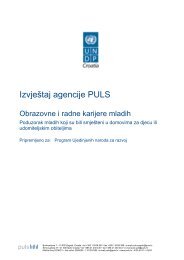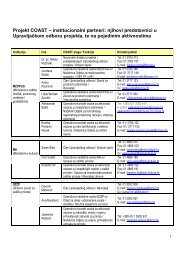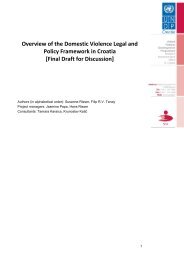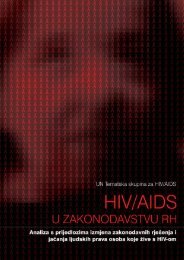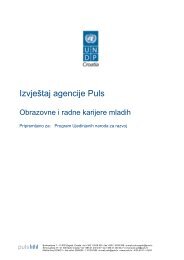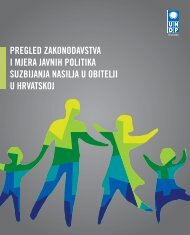WEB engleska verzija end.indd - UNDP Croatia
WEB engleska verzija end.indd - UNDP Croatia
WEB engleska verzija end.indd - UNDP Croatia
- No tags were found...
Create successful ePaper yourself
Turn your PDF publications into a flip-book with our unique Google optimized e-Paper software.
THE SOCIALLY EXCLUDEDCHAPTER 3civil rights of sexual minorities which has a negativeimpact on the quality of their life. The stigma andthe discrimination, which are connected with thedenial of certain rights, play a significant role in theincreased level of mental problems within this socialgroup. Another dimension is the exposure of sexualminorities to mental and physical abuse; an increasedrisk of victimization at public places, which causesfeelings of insecurity and is responsible for potentially(auto)destructive mental mechanisms (Pikićand Jugović, 2006). 168 The wide-spread intoleranceand homophobia in the general public is closely connectedwith this, which is reflected in an environmentwhere discrimination and abuse often pass with latentapproval. For sexual minorities, legislative reformsand public sensitisation are key social imperatives.3.14.7 Policy ImplicationsThe position (and consequently the vulnerability)of sexual minorities in <strong>Croatia</strong> can and should beimproved through a combination of legal and educationalmeasures. Am<strong>end</strong>ments to the existing SamesexUnion Act enabling the registration of same sexcouples and ensuring equal rights regarding marriageand parenthood, should be adopted as a priority. 169To aid this process, it would be helpful to organizea coordinated information campaign amongst MPsand the leaders of parliamentary parties. 170 The recentintroduction of hate crimes into the Criminal Actis an important legislative improvement. However, sofar, the scope of the provision is quite limited, withhate crimes only recognized if they result in the criminalact of murder (the hatred being an aggravatingcircumstance). Even so, this is still an important firststep in drawing attention to the violence committedagainst sexual minorities. This process needs tobe continued by applying the qualification of a hatecrime to other punishable actions (e.g., physical harm,sexual violence, etc.) in order to further deter violenceagainst this social group.The need for information dissemination and educationis a considerably more complex and versatile task.Programmes that promote understanding and tolerancetowards sexual diversity in various segments ofthe population need to be developed, implementedand evaluated. Information and educational effortsshould include youth (especially school-aged childrenand minors), their parents, experts in specificareas (the judiciary, the police, social workers, healthcare professionals – especially in the area of mentalhealth - and the educational system), as well as thegeneral population. In schools, sensitisation could beachieved by the planned introduction of health education,which will include modules on human sexualityand the prevention of violence. The sensitisationof experts, with the purpose of making them moreaware of the possible ‘’hetero-normative’’ constraintsof their practice, as well as informing them aboutthe specific needs of sexual minorities, should beorganized in cooperation with professional organizationsand civil society. Finally, sensitising the generalpublic will require the dedicated engagement of theelectronic media, especially the public TV.168 More than 40% of subjects surveyed in the first study on violence against persons of non-standard sexual orientation in <strong>Croatia</strong>considered suicide at least once (Pikić and Jugović, 2006.).169 Whether the right to adopt children will find its place amongst these rights should be left to an argumented expert and publicdiscussion. The realisation of full equality of sexual minorities should be viewed as a process which must take into account the values andjudgments present in the public. Needless to say, these values need to be viewed as temporary and changeable.170 Perhaps even direct suggestions of the European Union.171 Recently, an advocacy program related to counselling LGBTIQ individuals was started by an NGO. Also, American PsychologicalAssociation’s guidelines for working with LGB individuals and The Harry Benjamin International G<strong>end</strong>er Dysphoria Association’s Standardsof Care for G<strong>end</strong>er Identity Disorders were translated (Ženska soba, 2006; http://www.zenskasoba.hr/public_html/index.php?option=content&task=view&id=50&Itemid=51).121






